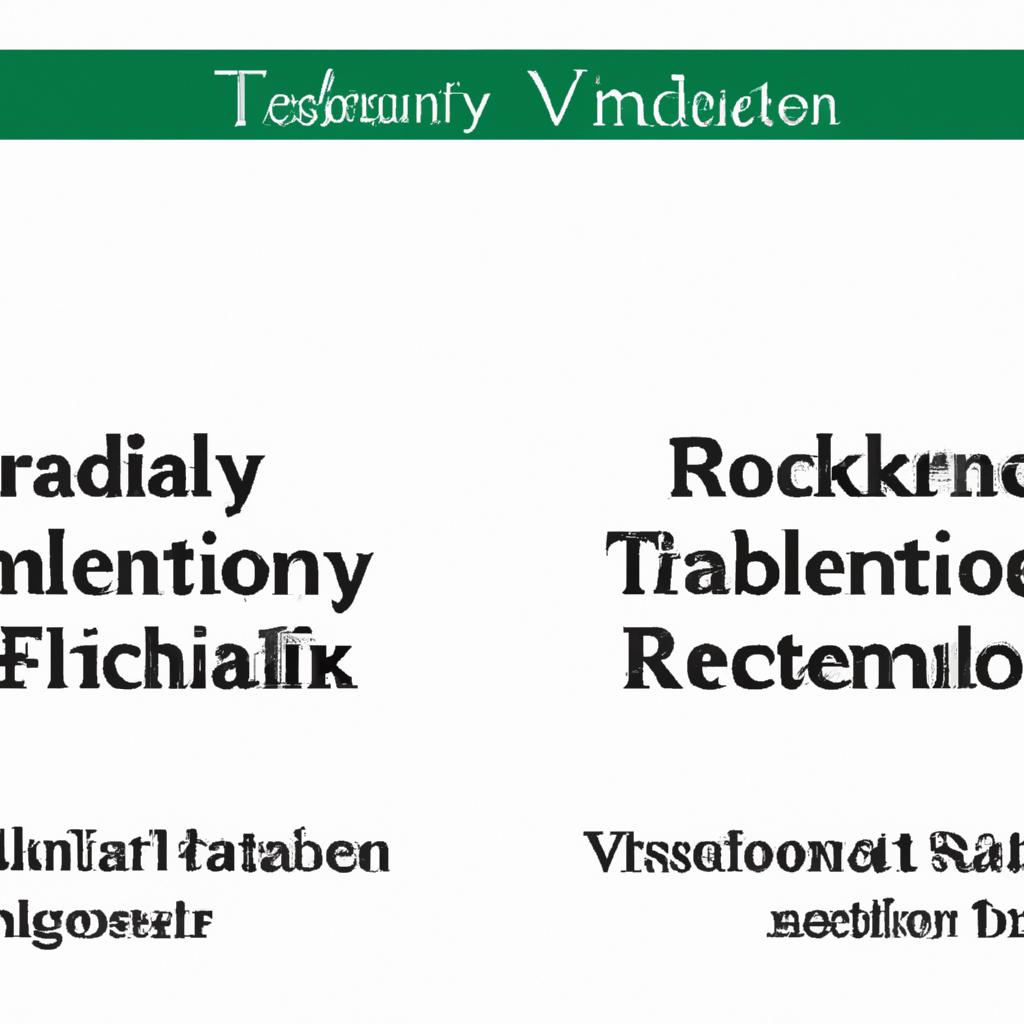In the realm of American industrial titans, the clash between the Rockefellers and Vanderbilts has stood the test of time as one of the most fascinating rivalries in history. From the oil-rich fields of Pennsylvania to the opulent mansions of New York City, these two dynastic families have captured the public imagination with their fierce competition and relentless pursuit of wealth and power. In this article, we will dissect the intricate details of this legendary feud, exploring the origins, motivations, and consequences of the Rockefeller-Vanderbilt rivalry with the precision and insight of seasoned legal practitioners. Join us as we unravel the complex web of intrigue and ambition that defined the era of Gilded Age America.
1. Key Differences in Wealth Accumulation Strategies Between Rockefeller and Vanderbilt Families
The wealth accumulation strategies employed by the Rockefeller and Vanderbilt families differ significantly in their approach and focus. While both families were incredibly wealthy and influential during their time, their methods of accumulating and managing their fortunes set them apart.
- Investment diversification: The Rockefellers were known for their strategic investments in various industries, ranging from oil to banking, which allowed them to spread risk and maximize returns. In contrast, the Vanderbilts focused more on luxury real estate and transportation, concentrating their wealth in a few key sectors.
- Philanthropic endeavors: The Rockefellers were pioneers in philanthropy, establishing foundations and institutions that have had a lasting impact on society. On the other hand, the Vanderbilts were more known for their extravagant lifestyles and lavish spending, with less emphasis on giving back to the community.

2. Analyzing the Impact of Industrialization on the Fortunes of the Rockefeller and Vanderbilt Dynasties
In the realm of industrialization, two prominent families emerged as powerhouses in the business world: the Rockefellers and the Vanderbilts. Both families rose to great wealth and success, but their paths were vastly different.
The Rockefellers, led by John D. Rockefeller, made their fortune in the oil industry with the creation of Standard Oil Company. Through monopolistic practices, they dominated the oil market and became incredibly wealthy. In contrast, the Vanderbilts, headed by Cornelius Vanderbilt, amassed their wealth through the railroad industry. Their empire of railroads stretched across the country, revolutionizing transportation and commerce. While both families benefited from the industrial boom, their legacies reflect distinct approaches to business and wealth accumulation.

3. Comparing Philanthropic Legacies: Rockefeller Foundation vs. Vanderbilt Charitable Trusts
When comparing the philanthropic legacies of the Rockefeller Foundation and the Vanderbilt Charitable Trusts, it becomes evident that both institutions have left a lasting impact on society. The Rockefeller Foundation, established by John D. Rockefeller in 1913, focuses on promoting the well-being of humanity worldwide through various initiatives in public health, education, and sustainable development. On the other hand, the Vanderbilt Charitable Trusts, founded by the Vanderbilt family, have a more localized approach, with a focus on supporting community-based projects in the New York City area.
While the Rockefeller Foundation boasts a larger endowment and a global reach, the Vanderbilt Charitable Trusts have made significant contributions to their community, particularly in areas such as education, healthcare, and the arts. Both foundations have been instrumental in advancing philanthropy and creating a positive impact on society, albeit through different strategies and scopes of work. In the end, the comparison between the two legacies serves as a reminder of the diverse ways in which individuals and families can leave a lasting mark on the world through charitable giving.

4. Expert Recommendations for Modern Estate Planning Inspired by Rockefeller and Vanderbilt Family Histories
When it comes to modern estate planning, there are valuable lessons to be learned from the histories of the Rockefeller and Vanderbilt families. Both families were pioneers in their respective industries and amassed great wealth during their lifetimes. By studying their estate planning strategies, we can glean insights into how to effectively preserve and transfer wealth across generations.
One key recommendation inspired by the Rockefeller and Vanderbilt family histories is to establish a comprehensive trust structure. Trusts provide a way to protect assets, minimize estate taxes, and ensure that your wealth is distributed according to your wishes. Another important consideration is the importance of regular reviews and updates to your estate plan. Laws can change, family dynamics evolve, and financial circumstances fluctuate, so it is essential to regularly reassess and adjust your estate plan to reflect these changes.
Q&A
Q: Who were Rockefeller and Vanderbilt and why are they considered rivals?
A: Rockefeller and Vanderbilt were two of the wealthiest and most influential figures in American history. Rockefeller, founder of Standard Oil, and Vanderbilt, a railroad and shipping magnate, were both titans of industry in the late 19th century. Their rivalry stemmed from their competing interests in the transportation and oil industries.
Q: How did Rockefeller and Vanderbilt amass their fortunes?
A: Rockefeller built his wealth through his oil refinery business, eventually forming Standard Oil and dominating the oil industry. Vanderbilt, on the other hand, made his fortune through investments in railroads and shipping, amassing a vast transportation empire.
Q: What were some of the key differences between Rockefeller and Vanderbilt?
A: Rockefeller was known for his ruthless business tactics and his control over the oil industry, while Vanderbilt was a shrewd investor who focused on expanding his transportation empire. Rockefeller was also more secretive and reclusive, while Vanderbilt was known for his flamboyant lifestyle.
Q: How did the rivalry between Rockefeller and Vanderbilt impact American business and society?
A: The rivalry between Rockefeller and Vanderbilt helped shape the modern American economy, with their influence felt in industries such as oil, transportation, and finance. Their competition also led to the rise of anti-trust laws and regulations aimed at curbing monopolies and promoting fair competition.
Q: What legacy did Rockefeller and Vanderbilt leave behind?
A: Rockefeller and Vanderbilt left a lasting legacy as two of the most successful and influential figures in American business history. Rockefeller’s Standard Oil Company revolutionized the oil industry, while Vanderbilt’s transportation empire helped drive the economic growth of the United States. Their names are still synonymous with wealth and power today.
In Summary
In conclusion, the rivalry between the Rockefellers and Vanderbilts was a fascinating chapter in American history, showcasing two of the most powerful families of the Gilded Age. Their competition for wealth, influence, and prestige left a lasting impact on the development of industry and society in the United States. While their paths diverged and their fortunes ebbed and flowed, the legacy of these two dynasties continues to shape our world today. Let us continue to study and learn from the lessons of their rivalry, as we navigate the complexities of power, progress, and legacy in our own time.
 Rockefeller vs Vanderbilt: The Rivalry of Two Titans of Industry
Rockefeller vs Vanderbilt: The Rivalry of Two Titans of Industry
When discussing the history of American industrialization and the rise of capitalism, the names Rockefeller and Vanderbilt are often mentioned in the same breath. These two men, John D. Rockefeller and Cornelius Vanderbilt, were both titans of industry and fierce competitors. But what were the key differences between these two men and their legacies? Let’s take a deeper look at the Rockefeller vs Vanderbilt rivalry and its impact on American history.
Background: The Making of Two Billionaires
John D. Rockefeller and Cornelius Vanderbilt were both born in the early 19th century into relatively modest families. Rockefeller was born in 1839 in New York to a relatively poor family, while Vanderbilt was born in 1794 into a well-established, wealthy family. Despite their different backgrounds, both men showed a keen interest in business from a young age.
Rockefeller started his entrepreneurial journey at the young age of 16 when he invested in a Cleveland shipping firm. This marked the start of his career in the oil industry, which would eventually make him one of the wealthiest men in history. Vanderbilt, on the other hand, started as a steamboat entrepreneur and eventually expanded his business empire to include railroads.
By the time of their deaths, Vanderbilt’s assets were worth an estimated $105 million, while Rockefeller’s were worth approximately $900 million – the equivalent of nearly $200 billion in today’s money. Their immense wealth and influence have left a lasting impact on American history.
Business Strategies: The Secret to Success
The success of both Rockefeller and Vanderbilt can be attributed to their shrewd business strategies and their ability to adapt to changing times. While both men were ruthless in their pursuit of success, their approach to business was quite different.
Rockefeller was known for his practice of horizontal integration, which involved controlling a single industry by owning all of its competing companies. This allowed him to control the entire oil industry from production to refining and distribution. This strategy not only made Rockefeller incredibly wealthy but also gave him immense power and influence over the American economy.
On the other hand, Vanderbilt was a pioneer of vertical integration – a strategy in which a company controls the entire supply chain. He did this by merging his steamboat business with the railroad industry, creating a monopoly in transportation. This allowed him to control both the production and distribution of goods, making him one of the wealthiest men of his time.
The Rise and Fall of Monopolies
The success of both Rockefeller and Vanderbilt was closely tied to their ability to eliminate the competition and create monopolies in their respective industries. However, this led to widespread criticism and eventually led to the implementation of anti-monopoly laws, known as the Sherman Antitrust Act, in 1890.
While Vanderbilt’s monopoly in the railroad industry was eventually broken, Rockefeller’s control over the oil industry remained intact for many years. It wasn’t until the landmark Supreme Court case, Standard Oil Co. of New Jersey v. United States, in 1911, that the Standard Oil Company was split into several smaller companies, effectively ending Rockefeller’s monopoly.
Philanthropic Endeavors: Giving Back to Society
In addition to their immense wealth and business acumen, both Rockefeller and Vanderbilt were also known for their philanthropic endeavors. Rockefeller is renowned for his contributions to education and healthcare, including the establishment of the University of Chicago and the Rockefeller Institute for Medical Research. He also donated more than $500 million to various charities throughout his lifetime.
Similarly, Vanderbilt also used his wealth to make significant contributions to education. He donated millions to various universities, including Vanderbilt University, which was named in his honor. Vanderbilt also made substantial donations to hospitals and charities throughout his life.
Lessons Learned: The Legacy of Two Rivals
The rivalry between Rockefeller and Vanderbilt not only shaped American business and industry but also left a lasting legacy on the country’s economy. Their ability to innovate and adapt to changing times allowed them to build vast business empires and accumulate immense wealth. However, their monopolistic practices also paved the way for regulations to prevent the concentration of power in the hands of a few individuals.
In conclusion, the Rockefeller vs Vanderbilt rivalry was a defining chapter in American history. While John D. Rockefeller and Cornelius Vanderbilt may have been fierce competitors, their legacies have had a lasting impact on American business, philanthropy, and the economy. Today, their names continue to be synonymous with success, entrepreneurship, and the American dream.

